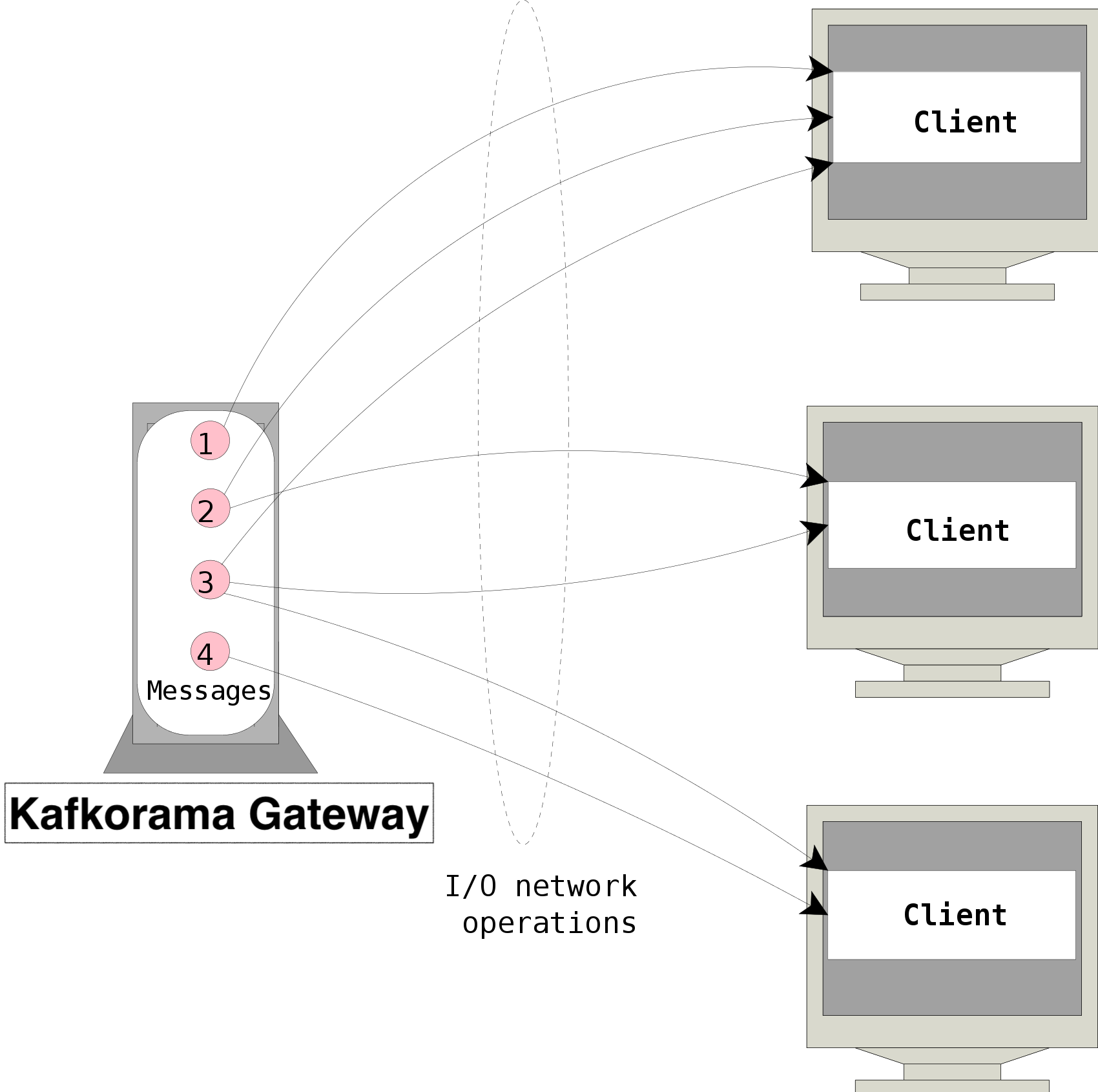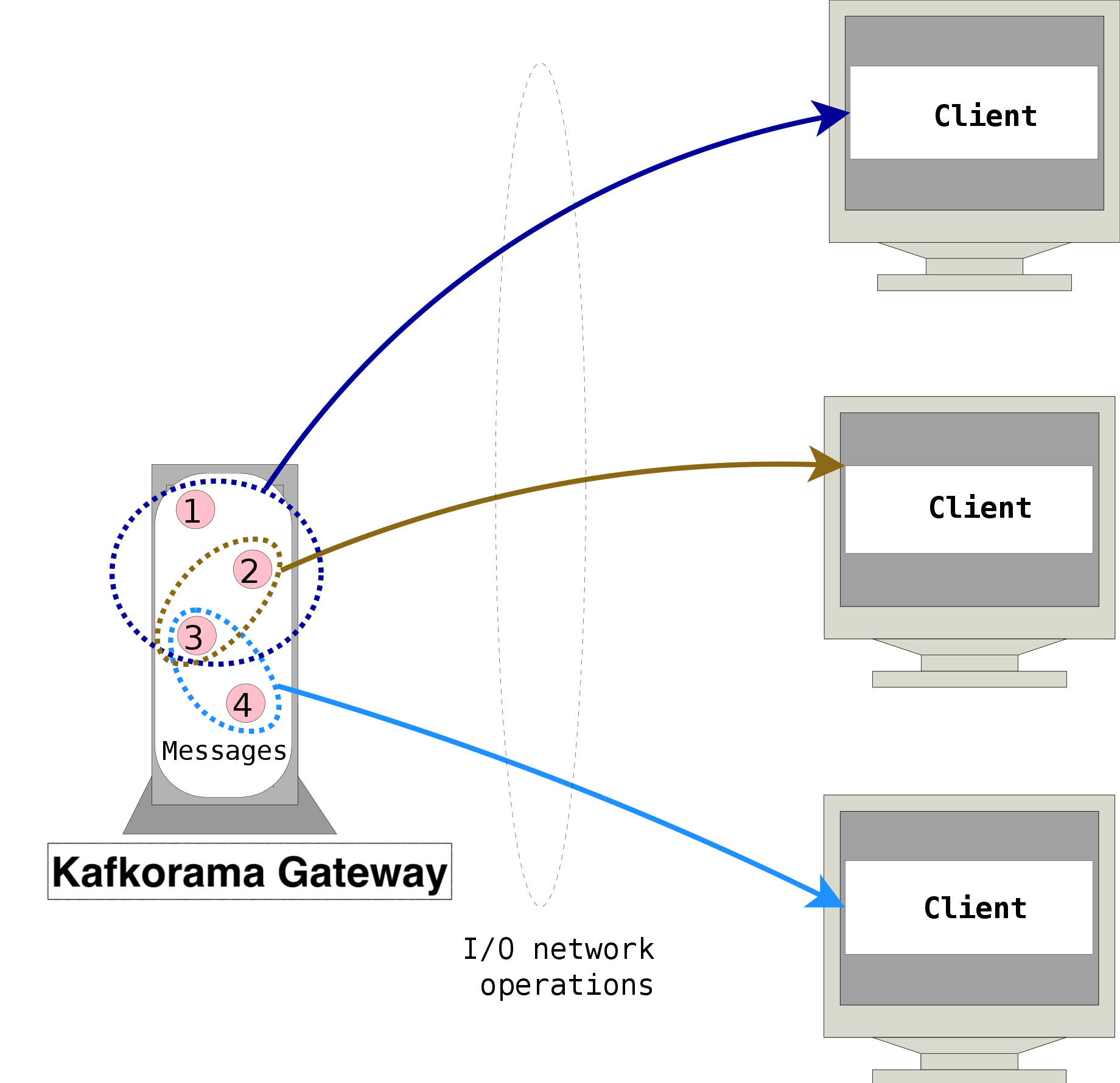Explore advanced options to fine-tune the performance and behavior of Kafkorama Gateway.
The advanced parameters of the Kafkorama Gateway are described below.
| Description | Specifies the unprivileged (non-root) user that Kafkorama Gateway should run as. |
| Default value | No default value |
| Required parameter | Optional |
If kafkorama is an existing unprivileged user, you can configure Kafkorama Gateway to run under this user by adding
the following to the configuration:
RunAsUser = kafkorama
To bind to privileged ports such as 80 or 443, you must start Kafkorama Gateway as root.
80 or 443, Kafkorama Gateway must briefly run
as root. However, it does not accept client connections during this phase, eliminating security risks. Once initialized,
it switches (with the setuid system call) to the specified unprivileged user, i.e. kafkorama,
before accepting any client.
| Description | Specifies which IP addresses are allowed to publish messages |
| Default value | No default value |
| Required parameter | Optional |
If this parameter is set, Kafkorama Gateway will accept message publications only from clients running on the IP addresses specified in this list.
If the parameter is not configured, message publication is allowed from any client — provided the client is
permitted by the entitlement rules you define (see the Entitlement parameter).
address/mask) is also supported, where address is an IPv4 address and
mask is a number between 1 and 32. The mask is optional, and defaults
to 32. For example, the following configuration allows message publications to Kafkorama Gateway only
from the IP address 192.168.5.23 and from any address in the 10.0.0.0 - 10.0.0.255 range:
PublishAllowFromAddressList = 192.168.5.23, 10.0.0.0/24
| Description | Specifies whether to use BoringSSL for native TLS/SSL communication |
| Default value | false |
| Required parameter | Optional |
This parameter accepts two values: true or false. If set to true, Kafkorama Gateway will use the BoringSSL library
for TLS/SSL support. BoringSSL typically offers better performance in terms of memory and CPU usage compared to the default
Java implementation. While this difference may be negligible for small or medium deployments, it is recommended to enable
Native.Ssl for large-scale deployments with millions of users.
| Description | The number of the most recent messages to be cached |
| Default value | 1000 |
| Required parameter | Optional |
For each subject, Kafkorama Gateway maintains a dedicated in-memory cache. Messages are continuously removed from the cache, but each message remains cached either:
CacheExpireTime has passed — whichever condition is met first.| Description | The number of seconds to cache a message |
| Default value | 180 |
| Required parameter | Optional |
For each subject, Kafkorama Gateway maintains a dedicated in-memory cache. Messages are continuously removed from the cache, but each message remains cached either:
| Description | The number of seconds to persist a snapshot message |
| Default value | 0 |
| Required parameter | Optional |
The Kafkorama Gateway stores a snapshot message in memory for each subject. By default, these snapshot messages are retained indefinitely. You can use this parameter to define a time limit, expressed in seconds, for how long snapshot messages should be kept in memory. This setting is particularly useful in environments where new subjects are frequently added but no longer updated after a certain point. Without an expiration time, snapshot messages from inactive subjects could accumulate and lead to memory issues.
| Description | The number of user groups for handling incoming connections |
| Default value | The number of CPU cores available on the system |
| Required parameter | optional |
To optimize scalability on multi-core systems, users are split into separate groups, each managed by its own thread. This parameter sets the number of such groups. If not specified, it defaults to the number of CPU cores. Changing this value is generally not recommended unless for advanced tuning.
| Description | The number of threads used for I/O operations |
| Default value | The number of CPU cores available on the system |
| Required parameter | Optional |
This parameter controls how many threads are allocated for handling I/O. By default, it matches the number of CPU cores. Changing this value is generally not recommended unless for advanced tuning.
| Description | Specifies the interval (in seconds) at which system statistics are logged |
| Default value | 60 |
| Required parameter | Optional |
This parameter controls how frequently various performance and usage statistics are written to the log. The minimum
allowed value is 5 seconds.
The log entries have the following format:
[timestamp] [S] [INFO] [STATS] {
connectedSessions,
connectedSessionsWeb,
connectedSessionsMobile,
connectedSessionsDesktop,
sessionConnectionsPerSecond,
sessionDisconnectionsPerSecond,
inPublishMessagesPerSecond,
outPublishMessagesPerSecond,
inBytesPerSecond,
outBytesPerSecond,
clientInPublishMessagesPerSecond,
connectRateRecoverySuccessPerSecond,
connectRateRecoveryFailPerSecond,
clientPublishFailedPerSecond }
| Description | The maximum size of a batch in bytes |
| Default value | 0 |
| Required parameter | Optional |
Batching groups multiple messages together before sending them in a single I/O operation to the client — either after a size threshold MaxBatchingSpace or a time threshold MaxBatchingTime is reached.
By default, batching by size is disabled. When enabled, Kafkorama Gateway sends messages in batches rather than individually. This reduces the number of I/O operations and improves performance, especially for use cases with high-frequency updates — such as multiple messages per second per subject across most subjects.
The diagram below illustrates the difference between message flow without batching (left) and with batching (right):
 |
 |
| Description | The maximum time window for batching, in milliseconds |
| Default value | 0 |
| Required parameter | Optional |
This parameter defines the maximum time to wait before sending a batch, regardless of its size.
See MaxBatchingSpace for an overview of batching.
By default, batching by time is disabled. Enable this parameter only for use cases with high-frequency updates — such as multiple messages per second per subject across most subjects.
| Description | Enables one or more TLS/SSL protocols |
| Default value | TLSv1.2, TLSv1.1, TLSv1 (for Java 8) |
| Required parameter | Optional |
For Java 8, the default enabled protocols are TLSv1.2, TLSv1.1, and TLSv1. You can override this default list by
configuring this SslProtocols parameter.
For example, to allow only the TLSv1.2 protocol:
SslProtocols = TLSv1.2
| Description | Enable one or more SSL ciphers besides the default JVM ciphers |
| Default value | No default value |
| Required parameter | Optional |
Use this parameter to enable one or more supported ciphers not enabled by default. For example:
CipherListEnabled = \
TLS_DHE_RSA_WITH_AES_128_CBC_SHA, \
TLS_DHE_DSS_WITH_AES_128_CBC_SHA
| Description | Exclude one or more SSL ciphers from the default JVM ciphers |
| Default value | No default value |
| Required parameter | Optional |
Use this parameter to exclude one or more ciphers enabled by default. For example:
CipherListEnabled = \
TLS_DHE_RSA_WITH_AES_128_CBC_SHA, \
TLS_DHE_DSS_WITH_AES_128_CBC_SHA
| Description | Specifies the maximum allowed message size in bytes |
| Default value | 65536 (64 KB) |
| Required parameter | Optional |
This parameter defines the maximum total size (in bytes) of a message — including protocol overhead — that Kafkorama Gateway will accept.
If a message sent by a client exceeds the configured MaxMessageSize (or its default value), Kafkorama Gateway will
reject it, and the client will receive a status notification with the code NOTIFY_MESSAGE_SIZE_LIMIT_EXCEEDED.
| Description | Maximum allowed bandwidth for outbound messages (bytes/second) |
| Default value | 0 |
| Required parameter | Optional |
This parameter limits the outbound bandwidth used by Kafkorama Gateway to deliver messages to clients. The rate is
specified in bytes per second (B/s). If set to 0 (the default), no bandwidth limitation is enforced.
This setting is especially useful when the message throughput temporarily exceeds the available network bandwidth. For example, if Kafkorama Gateway is running on a machine with a 1 Gbps (125 MB/s) network interface and needs to deliver a burst of 1250 MB of messages to many clients, setting:
MaxBandwidthRate = 1000000000
will ensure the messages are sent steadily over ~10 seconds, preventing system overload and maintaining low message latency. Without this cap, the kernel’s socket buffers could become saturated, impacting system performance.
Beyond burst scenarios, this parameter also acts as a safeguard — intentional or accidental — from exceeding the available network bandwidth capacity.
For most cases, it is recommended to set this value to match the maximum available outbound bandwidth of the system.
1000000000 (B/s) for 1 GbE networks, or
10000000000 (B/s) for 10 GbE networks. For Internet-based deployments, consult your network provider to
determine the appropriate bandwidth value.
| Description | Enables or disables access logging |
| Default value | false |
| Required parameter | Optional |
Set this parameter to log4j to enable access logging using the pre-installed Log4j audit extension located in the
addons folder of your Kafkorama Gateway installation.
| Description | Enables or disables cache logging |
| Default value | false |
| Required parameter | Optional |
Set this parameter to log4j to enable cache logging using the pre-installed Log4j audit extension located in the
addons folder of your Kafkorama Gateway installation.
| Description | Enables or disables message logging |
| Default value | false |
| Required parameter | Optional |
Set this parameter to log4j to enable message logging using the pre-installed Log4j audit extension located in the
addons folder of your Kafkorama Gateway installation.
| Description | Enables or disables stats logging |
| Default value | false |
| Required parameter | Optional |
Set this parameter to log4j to enable stats logging using the pre-installed Log4j audit extension located in the
addons folder of your Kafkorama Gateway installation.